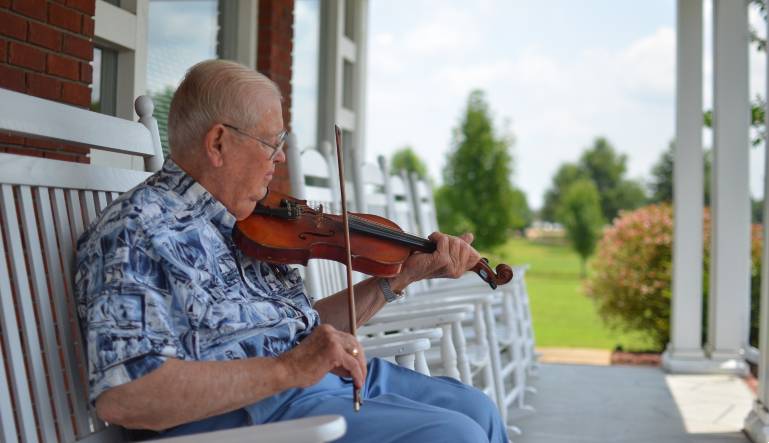Imagine taking a Sunday drive down a sunny, Indiana road and your favorite song from high school starts playing on the radio. You instantly feel happy and are tempted to sing along. You remember all the words. You’re amazed how quickly you recall the lyrics to a song you haven’t heard in 20 years.
Music is amazing.
These calming sensations and memory triggers inspired caregivers to use music in dementia care. In memory care communities like Five Star Senior Living, music is a proven method for soothing agitation in older adults with Alzheimer’s.
Many Alzheimer’s patients can remember lyrics and sing songs through even the more advanced stages of the disease, long after they lose recognition of names and faces.
How Does Music Help Alzheimer’s Patients?
Scientific Findings
According to studies from the Alzheimer’s Association, music increases an older adult’s happiness and social skills. Recent research proves that listening to music releases several neurotransmitters such as endorphins and dopamine in the brain, which sends positive signals through the body.
Music engages areas of the brain linked to concentration, stress reduction, making predictions and updating events stored in previous memories. Studies also suggest that music helps the brain organize new information.
Use Music to Promote Memory
A music and memory program is at its best when caregivers follow these three tips:
Choose the Correct Music
It’s best to pick songs from the senior loved one’s teenage years. The music your loved one listened to when they grew up is the most influential. It’s the music that shaped their lives.
Music and memory programs are most effective when you use your loved one’s favorite tunes because these are benchmark memories. These songs are more accessible for your senior to recall because they are engrained in their mind.
For example, if your loved one grew up in the 50s, he may enjoy Frank Sinatra songs. Or if your loved one was an avid churchgoer, try singing hymns with them.
Determine the Best Listening Method
Many memory care communities use iPods for their music and memory programs. Family caregivers can adopt this practice and personalize their loved one’s playlists, allowing them to enjoy their favorite tunes on their own device.
If iPods aren’t the best method, caregivers can try a vinyl record player and project their loved one’s favorite music in the comfort of their rooms for the whole family to enjoy.
Caregivers should try a few methods until they find one that works well and makes their senior loved one happy.
Use Music to Promote Social Engagement
According to the Alzheimer’s Association, music is one of the most effective methods for promoting engagement in adults with dementia. When a music and memory program is successful, it strengthens relationships between older adults and their families. It also forms bonds with members of a memory care community’s staff.
This type of therapy program also allows caregivers to use music to calm behaviors like agitation instead of relying on medications. The bottom line is that music’s healing harmonies can benefit both the older adult living with Alzheimer’s and their family caregivers.
To learn more about caring for a loved one with Alzheimer’s or about our award-winning dementia care program, *" indicates required fields

